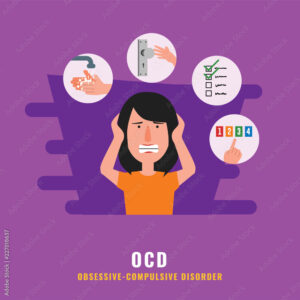Living with a loved one who suffers from OCD and anger can be difficult. The challenges of dealing with these conditions can seem overwhelming at times. It is important to remember that you are not alone in this, and there are ways to cope with the difficulties. In this blog post, we will discuss some of the best ways to handle living with someone who has OCD and anger.
Contents
Defining Obsessive Compulsive Disorder

Obsessive Compulsive Disorder is a condition that is characterized by repetitive and intrusive thoughts, as well as compulsions to perform certain actions. These thoughts and behaviors can cause a great deal of distress and anxiety for the sufferer. People with OCD often feel that they must perform their rituals to ward off some sort of disaster.
Obsessive-compulsive disorder (OCD) is a mental illness characterized by obsessive thoughts and actions. People who suffer from OCD may have either obsessional ideas or compulsions, depending on the source. Some people experience both obsessions and compulsions. Obsessive thoughts are unpleasant, intrusive ideas, images, or urges that make someone anxious. Compulsions are repetitive behaviors or mental acts that a person feels compelled to perform to relieve anxiety.
Anger Accompanying OCD
People who suffer from OCD also suffer from anger issues. The intensity of the anger can range from mild irritation to full-blown rage. The cause of this anger is usually related to the person’s anxiety and frustration over their OCD. This can lead to a vicious cycle, as OCD leads to more anxiety and frustration, which then leads to more anger generally experienced by the sufferer.
What kind of anger is generally experienced?
There are two types of anger that people generally experience: reactive and proactive. Reactive anger is a response to a perceived threat or injustice. It is usually out of proportion to the situation and can lead to impulsive actions. Proactive anger is premeditated and often results from pent-up frustration. It may be expressed in passive-aggressive behavior or be directed at innocent targets.
A person can:-
- Swell
- Vulgar comments
- Self-Harm
- Attacks
Thus, this makes living with a person who has OCD and anger very problematic but with due patience, it can be done for the good of your loved one.
Causes
If you or someone you care about is suffering from a mental illness, it’s difficult to make sacrifices for the benefit of others. The cause of the anger can be the following :
- Loved ones are unlikely to accommodate compulsive behaviors, which can result in a lot of anxiety. Others do not understand or minimize what it’s like to have OCD
- Interruptions that prevent compulsions from being completed or performed flawlessly.
- It may be difficult to keep feelings of irritation from hidden negative reactions to medication
- The symptoms of OCD, such as the need to execute compulsions flawlessly and constantly having distressing ideas prolonged levels of anxiety and stress.
- PANDAS: a trusted source that stands for ‘pediatric autoimmune neuropsychiatric disorders associated with streptococcal infections,’ which is strep throat in kids that causes or aggravates OCD by causing mood changes and irritation
Never Ending Certainty

One of the main characteristics of OCD is a seemingly never-ending sense of uncertainty. This can be extremely frustrating for both the sufferer and their loved ones. Living with a person who has OCD and anger can make you wonder why they are not able to control their impulsive thoughts. It is important to remember that OCD is a real and serious condition that requires treatment.
Conversely, if you feel as though your compulsions aren’t always correct, this might lead to a bout of furious temper. Because someone with OCD is concerned that if they do not follow their compulsions something terrible will happen, they may become terrified if their compulsions don’t work as planned. Even if it doesn’t have a target in mind, this anger can be taken out on friends, family, or strangers.
How To Manage The Anger Issues?

If you live with someone who suffers from OCD and anger, there are some things that you can do to help manage the challenges.
Understanding OCD
The first step is to try and understand what OCD is and how it can lead to anger. It is important to remember that OCD is a real and serious condition that requires treatment. If you can educate yourself on the condition, it will be easier to understand why your loved one behaves the way they do. The myths that revolve around cd are – Bad parenting cause OCD, people with OCD are just lazy, people with OCD are attention seekers, and people with OCD can just stop their compulsions if they wanted to.
Support and Accommodation
The second step is to provide support and accommodation. This means being understanding and patient when your loved one is going through a difficult time. It also means making accommodations for their compulsions. For example, if they need to wash their hands a certain number of times, you can try and provide them with a place to do this where it won’t be disruptive.
It can be helpful to create a support network of friends or family members who can offer emotional support. This can be a great outlet for you to vent about the challenges you are facing and to get advice from others who understand what you are going through. The adage “misery loves company” is true for a reason, and one of the most compelling reasons to join an OCD support group is to discover that you’re not alone.
Communication
The third step is to ensure that communication is open. This means being willing to talk about OCD and how it is affecting your loved one. It also means being willing to listen to their concerns. If you can open up a dialogue, it will be easier to identify triggers and find ways to cope with them. Be a good listener when they try to tell about their stuff to you, and try to be as patient as possible.
When your loved one is having a tough time, it can be easy to take their anger and frustration personally. It is important to remember that their anger does not direct at you. Their OCD is the root of the problem, not you. Remer that their anger does not in them and they are dealing with mental lines that trigger them to act in this way.
Be Patient
Dealing with OCD can be extremely difficult, both for the sufferer and their loved ones. It is important to be patient and understanding. Patients should be your utmost priority when dealing with a person having OCD. Be there for your loved ones when they need you, but also give them space when they need it. If they are having a tough time, offer to help them with their compulsions. Remember, they are not their OCD. They are strong and capable people who are just trying to make it through each day.
Seek Professional Help
If the situation is becoming too difficult to handle, it may be time to seek professional help. A therapist or counselor can guide how to deal with the challenges you are facing. They can also offer support and understanding that you may not be able to find elsewhere.
How ERP Can help?
Exposure and Response Prevention (ERP) therapy is a type of cognitive behavioral therapy that is effective in treating OCD. ERP therapy works by gradually exposing the person to their fears and helping them to resist the urge to perform their compulsions. It encourages you to face your fears and let obsessive thoughts occur without ‘putting them right’ or ‘neutralizing’ them with compulsions.
Exposure and Response Prevention (ERP) is the most common behavioral therapy for OCD. Real or imagined exposure to things or situations that produce obsessions that cause anxiety is used in exposure therapy. Due to exposure to these cues, anxiety begins to decrease until the elimination of anxiety. Habituation is the process of becoming involved in engaging in ritualistic behaviors to reduce the anxiety caused by OCD. In ERP treatment, patients learn to resist their compulsions and prevent themselves from performing rituals.
Conclusion
Living with someone who has OCD and anger can be challenging, but it is also possible to create a happy and healthy relationship. By following the tips above, you can help your loved one to manage their OCD and live a fulfilling life. If you are struggling to cope, don’t hesitate to seek professional help. If you want online therapy, you can reach out to us or download our free OCD treatment app on Android or iOS.


